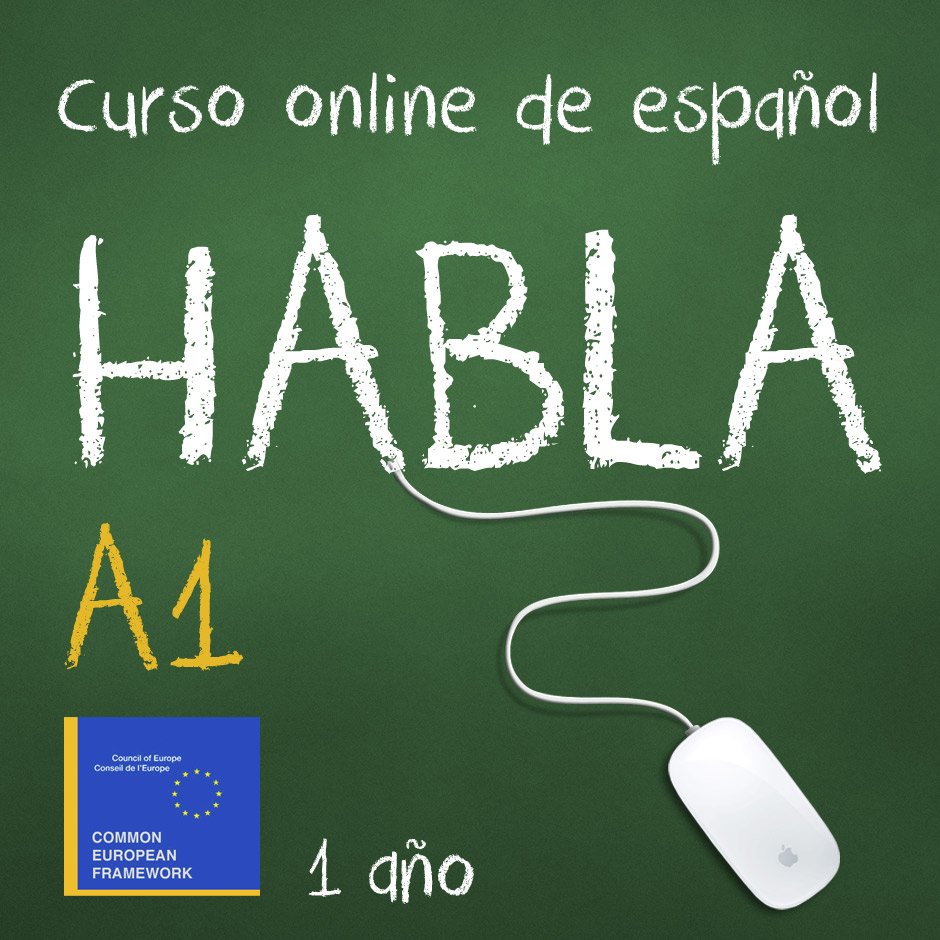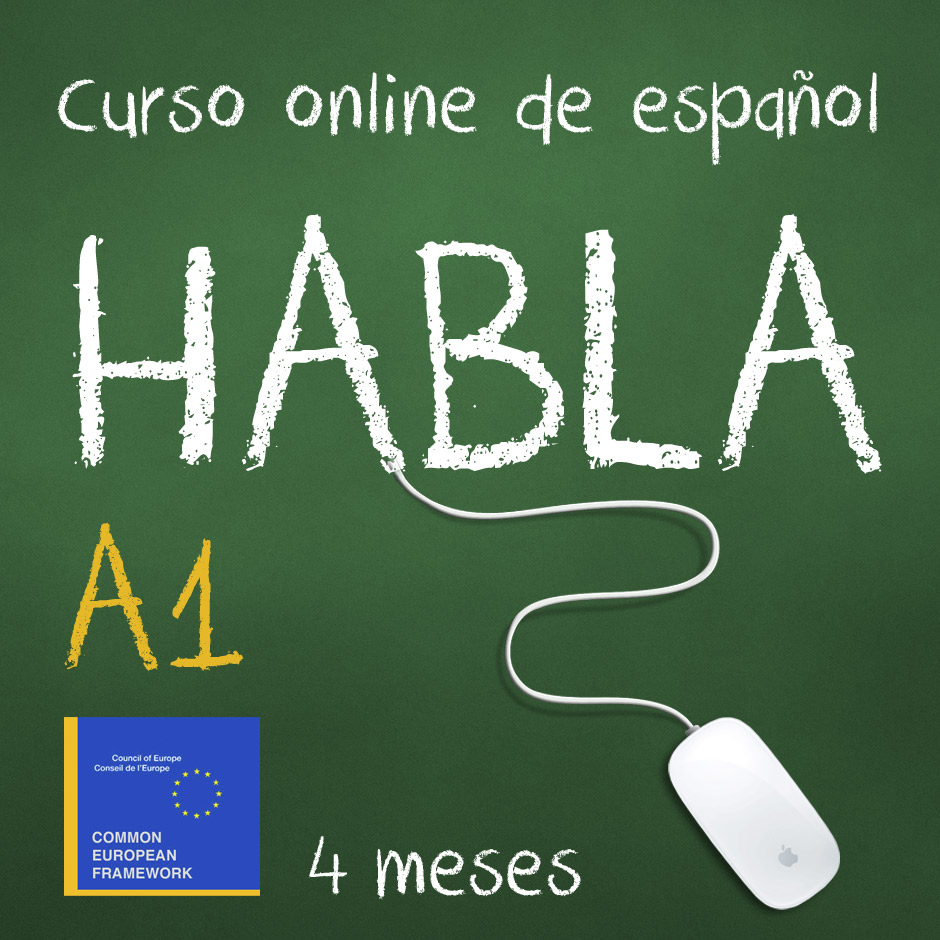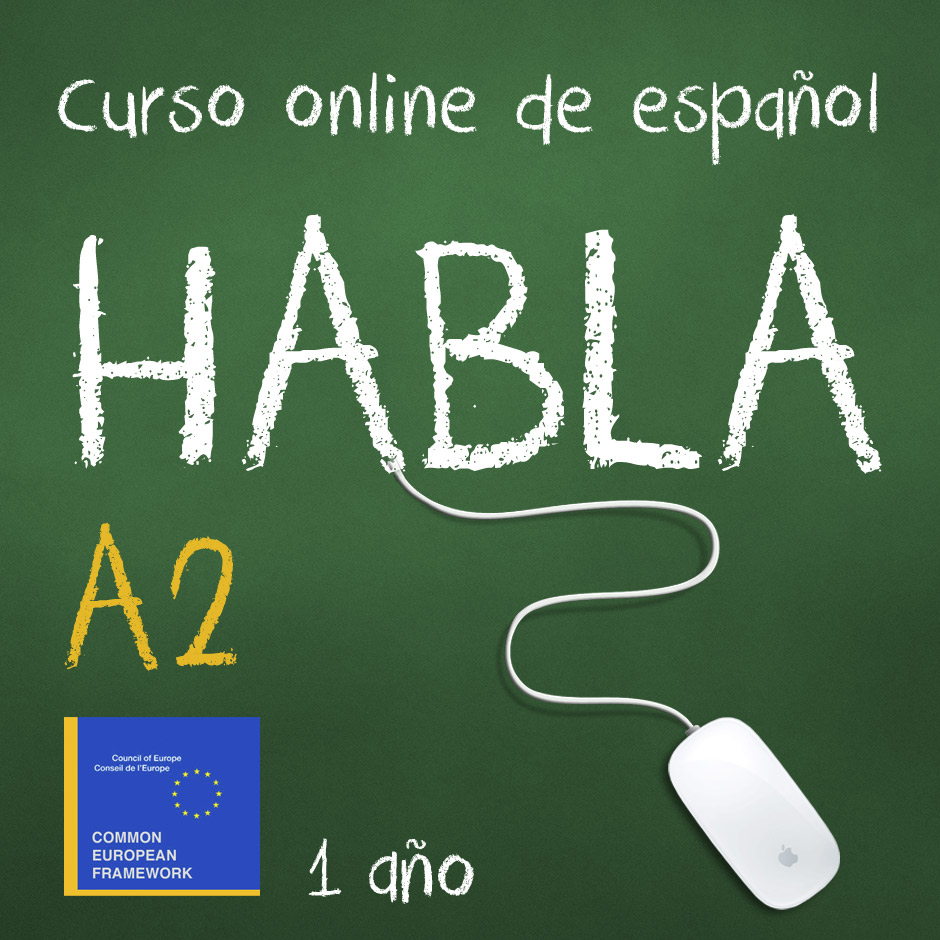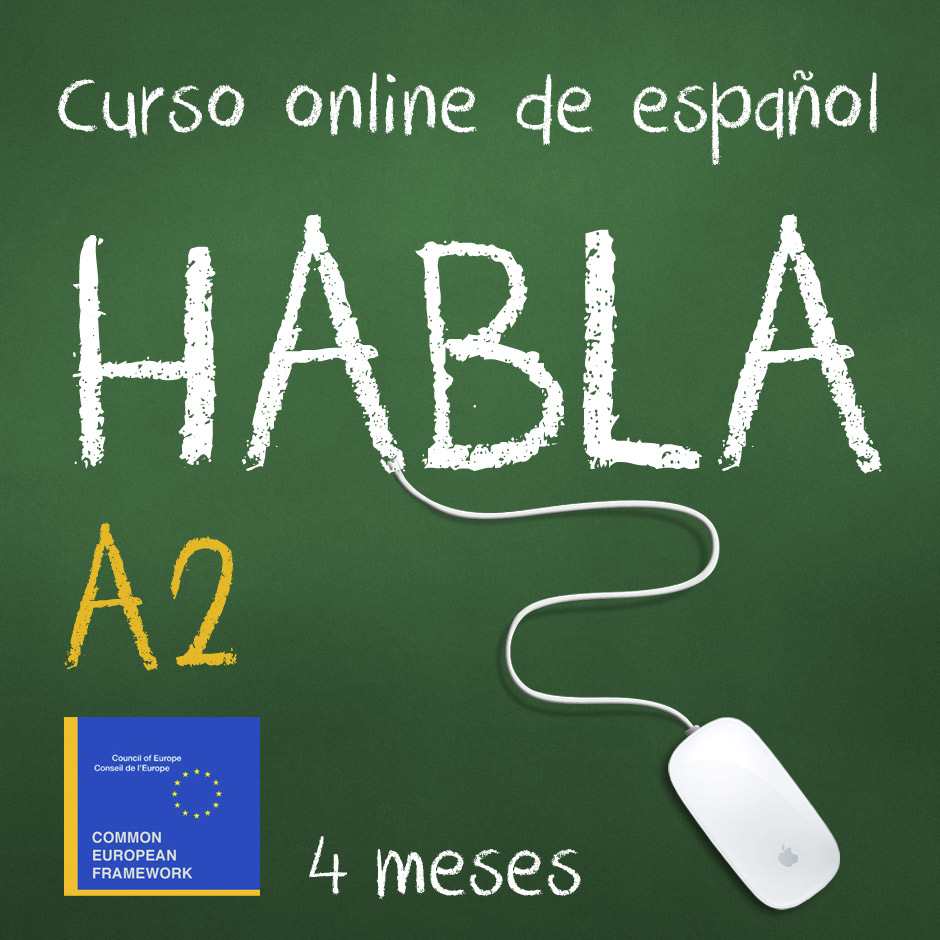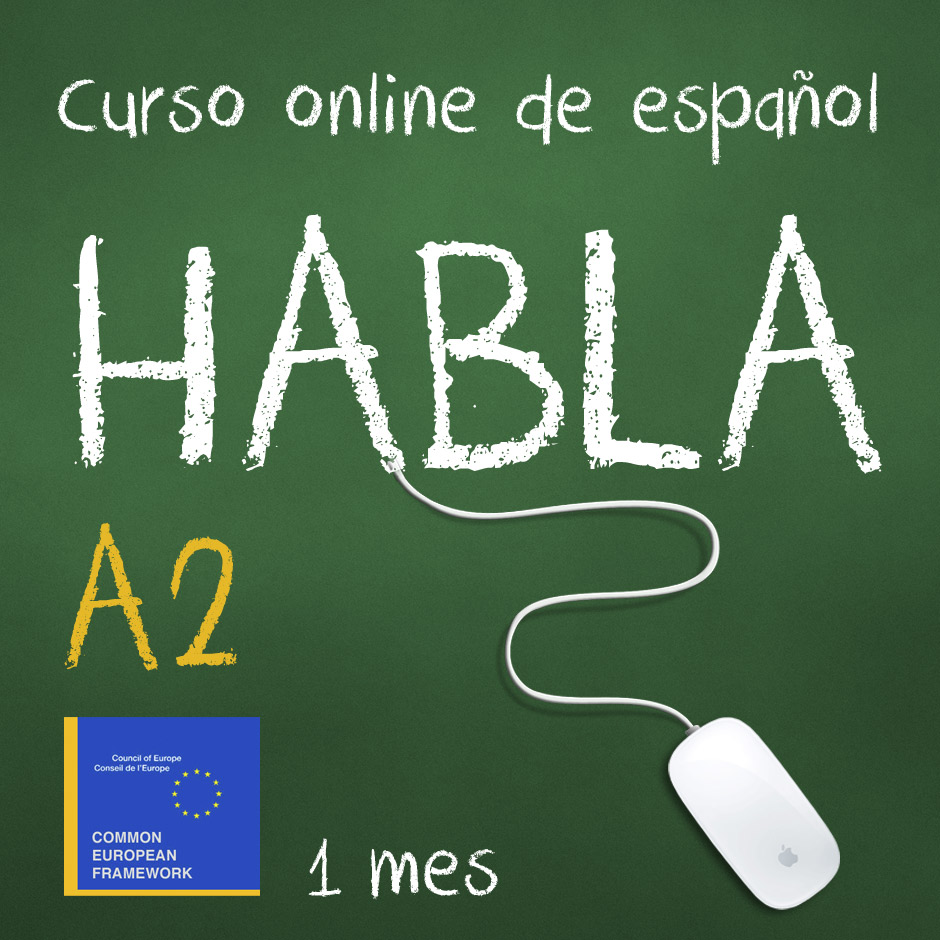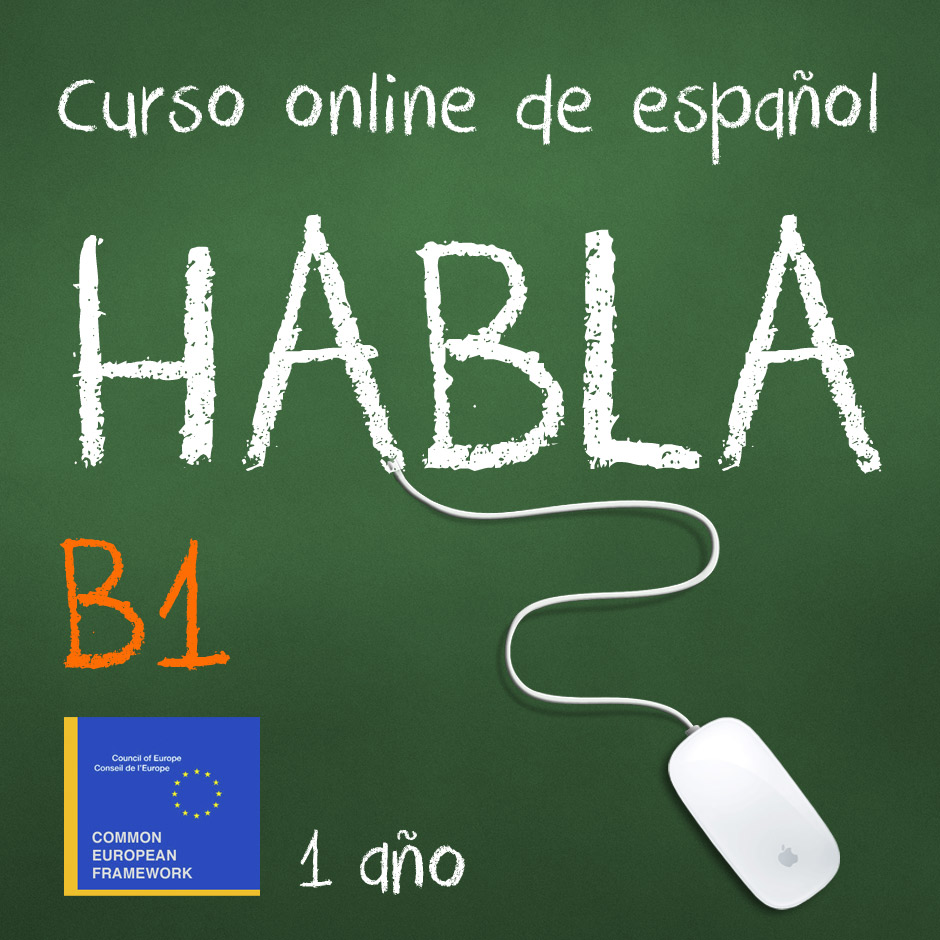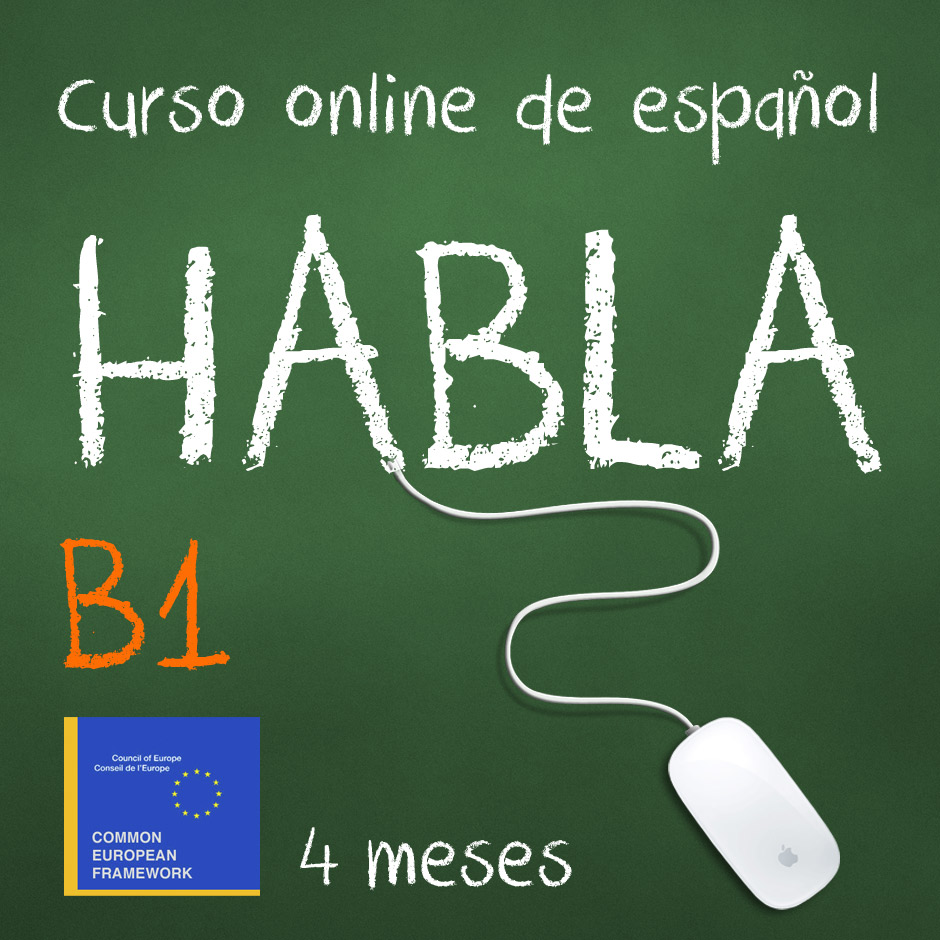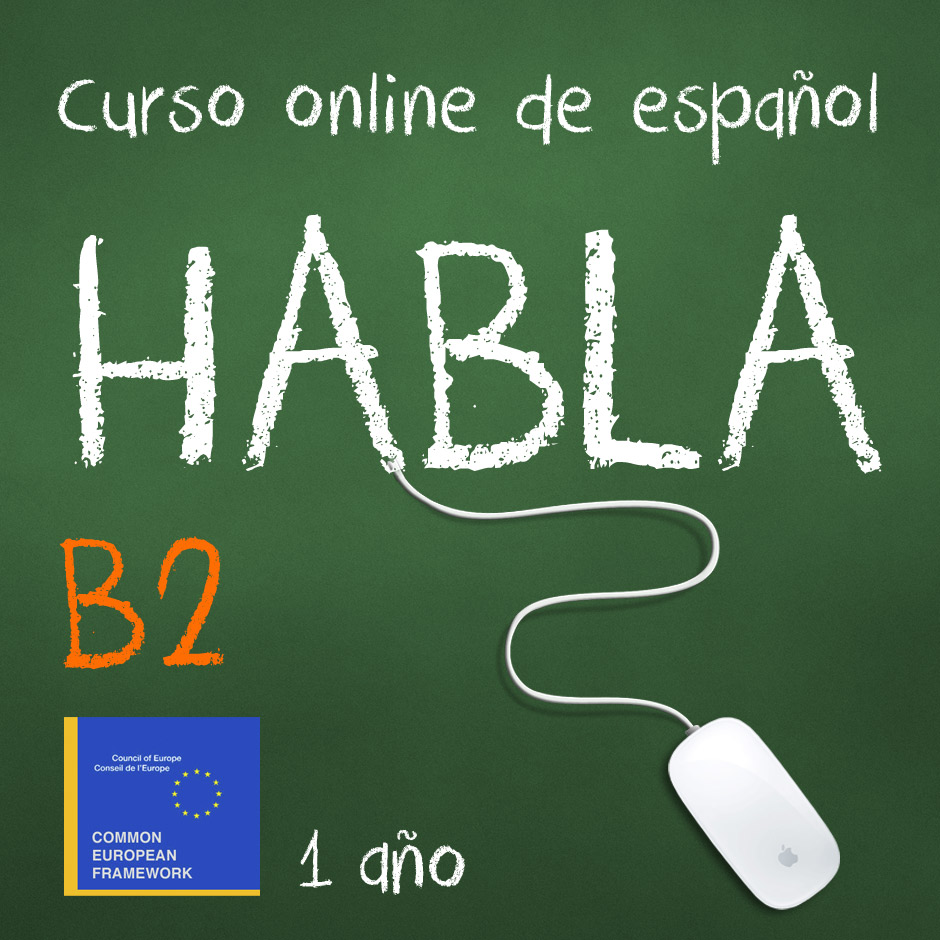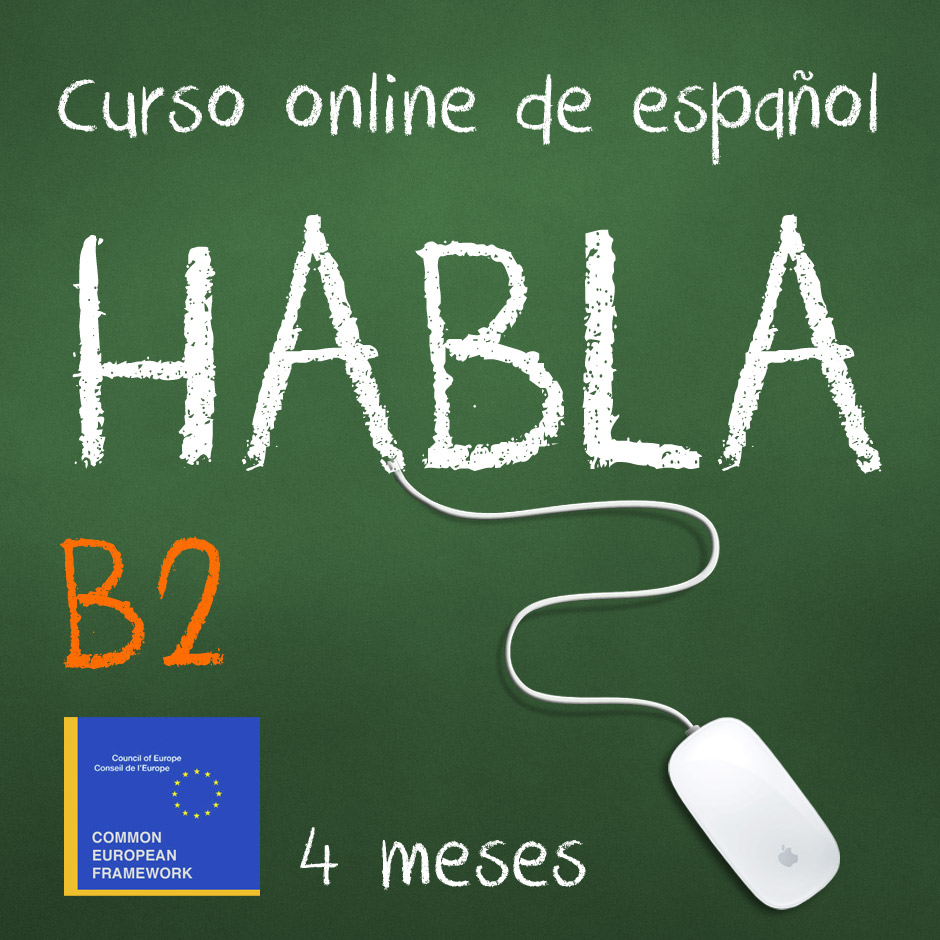COURSES AND LEVELS
Each course has between 15 and 20 units and all the contents of the Instituto Cervantes Curricular Plan.
The purchase of each level will give access to the course at any time during 1, 4 or 12 months.
The estimated number of training hours is between 125 and 150 hours per level. The number of hours depends on each student and varies according to their mother tongue and their ability to learn a foreign language. The first units are simpler to avoid frustrating the student.
In level A courses, the two versions of the course can be accessed at any time, one completely in Spanish and the other with instructions and statements in English. From level B1, the course is only in Spanish.
The English version of the Spanish courses contains the grammatical explanations and the statements of the activities in English. It is suitable for students who start studying Spanish and their mother tongue is English or for people who know some English.
The Spanish version of the courses is suitable for students who know Portuguese or Italian. If you have no knowledge of English or any of the above languages you can also choose the Spanish base language because the course is very visual and the explanations are short and simple.
LEVEL: BEGINNERS - A1. CONTENTS
- Presentations. Greetings and saying goodbye. Verbs llamarse, ser and conocer.
- Greetings: asking for and giving personal information. The verb estar.
- Nationalities and countries. Giving and asking for personal information about place of origin, quantities, etc. Verbs hablar and entender.
- he family. Family nouns. The plural of nouns and adjectives. Verbs vivir and tener.
- Names of things and daily actions. Providing and asking for information about things and where things are…, and self-assessment test.
- Name of rooms, furniture and household items. Verbs of everyday life. Modal verbs: querer, poder, necesitar…
- Nouns/adjectives indicating professions and places of work. Verbs for the professions. Ask for the cause and purpose…
- Nouns related to the measure of time (hour, day, month…). Telephone conversations. Verbs used for entertaining.
- Plans and obligations. Nouns and verbs related to leisure and fun. Days of the week, months of the year. Expressing obligation…
- Housework and related tasks. Frequency adverbs. Verbs in plural. Expressing duration of the actions…, and self-assessment test.
- The weather. Seasons and climates. The means of transport. The expression of taste (verbs gustar, encantar and preferir). Indirect object pronouns. Weather-related words: tiempo, clima, calor, frío, lluvia, niebla, viento, sol.
- Clothing and colors. Reflexive verbs. Keep and bear with clothes. Adjectives of appearance. Verbs used with clothing. Atonic pronouns.
- Foods and food shops. Meals in a day. Request information on prices and other verbs used when shopping.Foods and food shops. Meals in a day. Request information on prices and other verbs used when shopping.
- At the restaurant. Food and dishes. Names of meals and drinks. Express our tastes in food. Adjectives of praise.
- At the hotel. Nouns and verbs related to the environment of the hotel. Types of lodging. Request and receive information on hotels…, and self-assessment test.
LEVEL: ELEMENTARY - A2. CONTENTS
-
- In the city. Places and urban transport. Atonic and tonic pronouns. Participles.
- Sports and moods. Expressing concern, desire and admiration. Indefinite pronouns.
- A doctor visit. Verbs and health-related nouns and pains. Body parts. The imperative.
- Let’s go shopping. Names for shopping, clothes and accessories. Verbs related to shopping.
- Let’s go cooking. Nouns, verbs and adjectives related to the preparation of meals. The imperative negative…, and self-assessment test.
- Nouns and verbs related to the life and political views. Expressing agreement and disagreement. Passive and impersonal phrases with se.
- The Internet and business world. Nouns and verbs related to computers and communications. Adverbs ending in mente. Treatment in formal and informal letters and emails.
- The present perfect.
- Looking for a house or flat. Housing types. Parts and housing properties. The simple form of present perfect.
- We are going on a trip. Geographical locations. Travel-related actions. Time expressions. The simple form of present perfect for irregular verbs…, and self-assessment test.
- Studies: careers and subjects. The memories of the past. Nouns and verbs related to the world of studies. The past tenses in Spanish.
- The appearance of people. Verbs and adjectives of physical description. The gerund. The verb estar plus the gerund.
- The world of art: museums, cinema, theater. Names related to artistic expression. Gerund periphrasis. The expression of tastes and desires.
- The countryside and the city: rustic spaces and urban spaces. Animals and plants in the countryside. Social relationships.
- Our everyday life. Nouns and verbs related to personal hygiene. Gerund periphrasis…, and self-assessment test.
LEVEL: INTERMEDIATE - B1. CONTENTS
- How you are: the character of the people. Subjunctive present in regular and irregular verbs. Some uses of the subjunctive. The expression of desire.
- How are you at the present time: moods. Differences between ser, estar and ponerse + adjective. Formation of opposites in adjectives. Express joy, anger, nervousness, resignation …
- The couple and friends. Selection of mode with opinion and possibility. Subjunctive in the expressions of valuation. Possessive tonic and unstressed: placement and restrictions of use. Express affection and dislike. To apologize and to promise.
- Human and family relationships. Relative clauses: uses to emphasize and alternation el que, la que, los que … Identify and define with grammatical relative. Introduce oneself formally and informally.
- Education: the school system, examinations and grades. Simple future. Uses of the future. Express agreement and disagreement.
- The University: studies, careers and subjects. Temporary expressions of the future. Infinitive aspectual periphrasis. The verb gustar and the verb preferir with sentence complement. Express plans and intentions.
- Banks and money. Temporary subordinate clauses. Selection of the mode in the temporary subordinates.
- Business: the economy and companies. Locutions and adverbs of time and quantity. Ask for and give information about the weather. Reassure and console.
- The body and personal hygiene: the parts of the body. The circle of life. The conditional mode. Uses of the conditional. The courtesy conditional. Express hope. Ask permission and help.
- Health: accidents, diseases, doctors and hospitals … Intensifying Adverbs. Placement of personal pronouns with the infinitive. Express physical and mental sensations. To wish someone gets better.
- Leisure and free time: hobbies and games. Subordinated of mode with como. Causal subordinated sentences. Place subordinates. Express ability.
- Parties. Se as a mark of reciprocity. Se in impersonal prayers. Express pleasure and fun. The expression of order.
- The media: press, radio and television. Consecutive sentences. Subordinate direct complement with thought verbs. Expressions to value. Expressions to conclude.
- Communication between people. Conditional sentences. Conditional connectors. Express knowledge and ignorance.
- Food: fruits, vegetables, legumes, meat, fish … Imperative. Irregular imperatives. Uses of the imperative. Give orders and instructions, imperative.
- Eating and cooking: household chores related to eating. Passive sentences with each other. Parsers of grammatical discourse. Give instructions with the impersonal se.
- Culture: literature, music, architecture, art … Subordinate clauses of purpose. Prohibit and reject a prohibition.
- The cinema: the artists and their audience. Concessive sentences. Indicative and subjunctive in concessionary sentences. Adversary connectors. Propose and suggest.
- Shopping: clothing, footwear and materials. Pretérito pluscuamperfecto. Ask for information about things and quantity.
- Fashion: description of clothes. Adverbs in mind. Adverbs of manner. Focusing Adverbs. Excluding adverbs. Ask and accept apologies.
LEVEL: INTERMEDIATE - B2. CONTENTS
1. La vivienda y los tipos de vivienda. Oraciones de comparativo relativo. Comparando la cantidad. Formas de expresar alegría, admiración y orgullo.
2. La casa: tareas y reformas en el hogar. Comparativos especiales, partitivos y multiplicativos, anteposición del adjetivo. Expresiones para ofrecerse y para pedir ayuda. El texto expositivo: definiciones y cartas.
3. Problemas de la humanidad: emigración, contaminación, guerras… Los materiales y sus cualidades. Pretérito imperfecto de subjuntivo. Oraciones condicionales con imperfecto de subjuntivo. Expresiones para pedir y dar opinión.
4. El cuidado del medioambiente: el reciclado de productos. Estilo directo frente al estilo indirecto en español. Los adverbios del discurso. Mostrar interés, desinterés y aceptación. El texto expositivo: trabajos académicos.
5. Los servicios sociales y de ayuda pública. Formas y usos del pretérito perfecto de subjuntivo. Adjetivos seguidos de preposición. Expresiones para tranquilizar, consolar y valorar.
6. Los servicios de protección y seguridad de los ciudadanos. La voz pasiva en español. Expresiones para pedir y dar permiso; y para prohibir y rechazar una prohibición. El texto argumentativo: los foros.
7. El mundo de las empresas. Formas y usos del modo condicional. Expresiones para dar consejos.
8. Buscando empleo: la contratación laboral. Las siglas. Estar de + profesión. Las preposiciones por y para. Expresiones para preguntar y para expresar la habilidad para hacer algo. Los marcadores que ayudan a estructurar el discurso y los reformuladores.
9. Las profesiones en español. El sector público y el privado. El género en las profesiones. Alternancia en el uso del pretérito perfecto simple y el pretérito imperfecto. Formas de expresar los deseos, los planes y las intenciones.
10. El turismo y las vacaciones. El modo en los verbos copulativos ser y estar. Formas de expresar el recuerdo y el olvido, la sorpresa y la extrañeza. Los conectores en español. El texto argumentativo: los artículos de opinión.
11. Los viajes y el transporte. Verbos con preposición en español. Expresiones con el movimiento y la distancia. Pedir y dar información sobre el lugar. Pedir y dar información sobre el lugar.
12. Hablar por el móvil. Formas de expresar la duración y la frecuencia. Formas de expresar obligación y necesidad en español. El texto descriptivo.
13. Internet y las nuevas tecnologías. Formación de verbos en –ear e –izar. Pretérito perfecto frente a pretérito indefinido. Expresar escepticismo e incredulidad.
14. Nuestro planeta la Tierra: los accidentes geográficos. El artículo con nombres propios. Formación de nombres abstractos a partir de adjetivos en español. Criticar los hechos y a las personas. Características del texto narrativo.
15. El clima y el tiempo atmosférico. Casos especiales del artículo y del género de los nombres. El pronóstico del tiempo. Formas de expresar la certeza y la evidencia.
16. El conocimiento científico. Formas y usos del pretérito pluscuamperfecto de indicativo y del pretérito pluscuamperfecto de subjuntivo. Expresiones para proponer y sugerir. La noticia: una forma de texto narrativo.
17. Gobierno, política y sociedad. Formación y usos del futuro perfecto: formación. Nexos que introducen oraciones temporales. Formas de aconsejar, advertir, amenazar y reprochar.
18. Nuestro cuerpo y nuestra salud. Las sensaciones físicas. El condicional compuesto y las oraciones condicionales en español. Formas de expresar alivio, esperanza, decepción y resignación. El texto narrativo: la biografía.
19. El carácter y los sentimientos. Ser con complemento de lugar. Oraciones finales. Formas de expresar tristeza, nerviosismo, empatía, vergüenza y afecto.
20. Los juegos y los deportes. Repaso general de la conjugación verbal del español. Formas de expresar placer y diversión, aburrimiento y enfado. El texto narrativo: el cuento.

